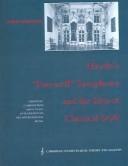| Listing 1 - 2 of 2 |
Sort by
|
Book
ISBN: 9781107005785 9780511794384 9781139161435 1139161431 9781139159388 1139159380 1283342499 9781283342490 9781139152884 1139152882 1107005787 9781139157612 1139157612 051179438X 1107221390 9786613342492 1139160435 1139155865 Year: 2011 Publisher: Cambridge : Cambridge University Press,
Abstract | Keywords | Export | Availability | Bookmark
 Loading...
Loading...Choose an application
- Reference Manager
- EndNote
- RefWorks (Direct export to RefWorks)
Felix Mendelssohn has long been viewed as one of the most historically minded composers in western music. This book explores the conceptions of time, memory and history found in his instrumental compositions, presenting an intriguing new perspective on his ever-popular music. Focusing on Mendelssohn's innovative development of cyclic form, Taylor investigates how the composer was influenced by the aesthetic and philosophical movements of the period. This is of key importance not only for reconsideration of Mendelssohn's work and its position in nineteenth-century culture, but also more generally concerning the relationship between music, time and subjectivity. One of very few detailed accounts of Mendelssohn's music, the study presents a new and provocative reading of the meaning of the composer's work by connecting it to wider cultural and philosophical ideas.
Cyclic form (Music) --- Instrumental music --- Music, Instrumental --- Music --- Cyclical form (Music) --- Musical form --- History and criticism --- Mendelssohn-Bartholdy, Felix, --- Mendelʹson-Bartolʹdi, Feliks, --- Mendelʹson, Feliks, --- Men-te-erh-sung, F., --- Mendelssohn-Bartholdy, Jakob Ludwig Felix, --- Bartholdy, Felix Mendelssohn-, --- Mendelssohn, Felix, --- Mendelssohn, F. --- Mendelssohn-Bartholdy, F. --- Mendelson-Bartoldi, F. --- Bartolʹdi, Feliks Mendelʹson-, --- Mendelson-Bertoldi, Feliḳs, --- Bertoldi, Feliḳs Mendelson-, --- Mendelssohn-Bartholdy, Jacob Ludwig Felix, --- מנדלסון־ברתולדי, פליקס --- מענדעלסאהן, פעליקס, --- Mendelsohn-Bartholdy, Felix, --- Criticism and interpretation. --- History and criticism. --- Mendelssohn-Bartholdy, Felix --- Mendelssohn, Felix --- Mendelssohn-Bartholdy, Jakob Ludwig Felix

ISBN: 0521385202 0521612012 1139085158 0511552432 Year: 1991 Publisher: Cambridge : Cambridge University Press,
Abstract | Keywords | Export | Availability | Bookmark
 Loading...
Loading...Choose an application
- Reference Manager
- EndNote
- RefWorks (Direct export to RefWorks)
This volume offers a new view of Joseph Haydn's instrumental music. It argues that many of Haydn's greatest and most characteristic instrumental works are 'through-composed' in the sense that their several movements are bound together into a cycle. This cyclic integration is articulated, among other ways, by the 'progressive' form of individual movements, structural and gestural links between the movements, and extramusical associations. Central to the study is a detailed and comprehensive analysis of the 'Farewell' Symphony, No. 45 in F sharp minor (1772). The analysis is distinguished by its systematic use of different methods (Toveyan formalism, Schenkerian voice leading, Schoenbergian developing variation) to elucidate the work's overall coherence. The work's unique musical processes, in turn, suggest an interpretation of the entire piece (not merely the famous 'farewell' finale) in terms of the familiar programmatic story of the musicians' wish to leave Castle Eszterhaza. In a book which relates systematically the results of analysis and interpretation, Professor Webster challenges the concept of 'classical style' which, he argues has distorted our understanding of Haydn's development, and he stresses the need for a greater appreciation of Haydn's early music and of his stature as Beethoven's equal.
Classicism in music --- Instrumental music --- -Symphony --- -Sinfonietta --- Symphonies --- Symphonietta --- Symphony --- Musical form --- Music, Instrumental --- Music --- Style, Musical --- History and criticism --- Haydn, Joseph. --- -History and criticism --- Haydn, Franz Joseph --- -Style, Musical --- Sinfonietta --- 78.21.1 Haydn --- -Music, Instrumental --- Haydn, Joseph --- Gaĭdn, Ĭ., --- Gaĭdn, Ĭosif, --- Gaĭdn, Ĭozef, --- Haiden, Josip, --- Haidnas, J., --- Haidun, --- Hayden, Joseph, --- Haydn, --- Haydn, F. J. --- Haydn, Franz Josef, --- Haydn, Franz Joseph, --- Haydn, Giuseppe, --- Haydn, Ios. --- Haydn, J. --- Haydn, Jos. --- Haydn, Josef, --- Heyden, Joseph, --- Khaĭdn, Ĭozef, --- היידן, י., --- -Musical form --- Classicism in music. --- Cyclic form (Music) --- History and criticism. --- Haydn, Joseph, --- Cyclical form (Music)
| Listing 1 - 2 of 2 |
Sort by
|

 Search
Search Feedback
Feedback About
About Help
Help News
News